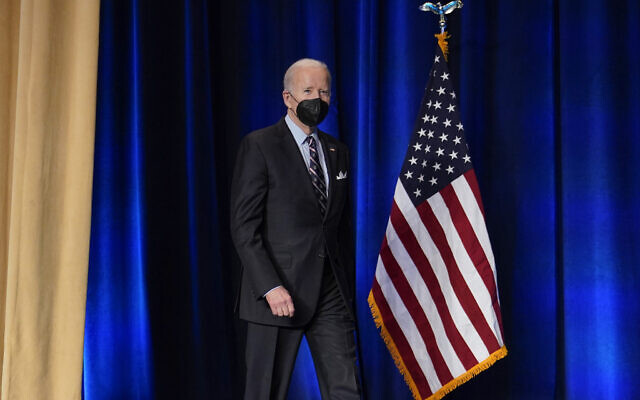Senate passes $1.5 trillion spending bill including Iron Dome aid, Ukraine help
Upper house approves $1 billion in extra funding for missile system 5 months after GOP senator held it up; $13.5 billion for Ukraine, aid for Palestinians also approved
By JACOB MAGID and AP

From left, European Union Ambassador Stavros Lambrinidis, Sen. Dick Durbin, D-Ill., Sen. Jeanne Shaheen, D-N.H., German Ambassador Emily Haber, and Lithuanian Ambassador Audra Plepyte join other diplomats to discuss the Russian invasion of Ukraine, at the Capitol in Washington, Thursday, March 10, 2022. (AP Photo/J. Scott Applewhite)
It was then brought before the Senate where it was a Republican that held the bill up for months as Sen. Rand Paul refused to allow the fast-tracking of the bill due to his opposition to US foreign aid more broadly.
It took roughly five months until Congressional leadership agreed to stick the Iron Dome funding in the omnibus package.
After the spending bill passed on Wednesday night, Prime Minister Naftali Bennett, Defense Minister Benny Gantz and Foreign Minister Yair Lapid hailed the victory and released statements thanking their allies in Washington.
Also included in the bill is the $3.8 billion in defense aid for Israel in line with the Memorandum of Understanding signed by former president Barack Obama in 2015.
The bill also includes the Israel Normalization Act, allocating funds to help strengthen and expand the Abraham Accords Israel has signed with several of its Arab neighbors. The legislation will include language supporting a two-state solution, which had been the reason why Republican Senator Ted Cruz was blocking the bill from advancing for months.
Fifty million from the bill will go toward funding the Middle East Peace Partnership Act, which grants $250 million in Congressional funding over five years for Israeli-Palestinian dialogue programs and Palestinian business development.

US President Joe Biden arrives to speak at the Democratic National Committee’s Winter Meeting, Thursday, March 10, 2022, in Washington. (AP Photo/Patrick Semansky)
The package includes $219 million for the Economic Security Fund, which supports humanitarian projects for Palestinians in the West Bank and Gaza Strip. This is the largest amount since 2015. The Palestinian Authority security forces will also receive $40 million in US aid from the bill.
The bill increases funding for nonprofit security from $180 million to $250 million, a hike that Jewish groups have been pressing for, especially after the hostage-taking in a Texas synagogue in January. At least two proposed laws are seeking further increases: Reps. Benny Thompson, a Democrat from Mississippi and the chairman of the Homeland Security Committee, along with John Katko, a Republican from New York, last week got the committee to approve a bill that would increase funding for the security grants portion of the security increase to $500 million.
Other funding backed by Jewish groups in the omnibus includes $6 million for assisting elderly Holocaust survivors and $5 million to streamline and improve the tracking of hate crimes.
Around half the $13.6 billion for Ukraine will go toward arming and equipping the country along with the Pentagon’s costs for sending US troops to other Eastern European nations skittish about the warfare next door. Much of the rest included humanitarian and economic assistance, strengthening regional allies’ defenses and protecting their energy supplies and cybersecurity needs.
Republicans strongly backed that spending. But they criticized Biden for moving too timidly, such as in the unresolved dispute with Poland over how that nation could give MiG fighter jets to Ukraine that its pilots know how to fly.
“This administration’s first instinct is to flinch, wait for international and public pressure to overwhelm them, and then take action only after the most opportune moment has passed us by,” said Senate Minority Leader Mitch McConnell, R-Ky.

Senate Majority Leader Chuck Schumer, D-N.Y., speaks to reporters about the Russian invasion of Ukraine following a Democratic strategy meeting at the Capitol in Washington, Tuesday, March 8, 2022. (AP Photo/J. Scott Applewhite)
“We promised the Ukrainian people they would not go at it alone in their fight against Putin,” Senate Majority Leader Chuck Schumer, D-N.Y., said just before the vote. “And once we pass this funding in a short while, we will keep that promise.”
White House aides told Congress last month that Biden wanted $6.4 billion to counter Russia’s invasion. He ended up formally requesting $10 billion, an amount that it took an eager Congress just a few days to boost to its final figure of $13.6 billion.
The $1.5 trillion bill carrying that aid gave Democrats a near 7% increase for domestic initiatives, which constituted a bit less than half the package. That translated to beefed-up spending for schools, housing, child care, renewable energy, biomedical research, law enforcement grants to communities and feeding programs.
Republicans lay claim to an almost 6% boost for defense, including money for 85 advanced F-35 fighter planes, 13 new Navy ships, upgrades for 90 Abrams tanks, a pay raise for troops and improvements for schools on military bases. There would be another $300 million for Ukraine and $300 million for other Eastern European allies on top of the measure’s emergency funding.

Senate Minority Leader Mitch McConnell of Ky., arrives to speak with reporters about aid to Ukraine, on Capitol Hill, Wednesday, March 10, 2022, in Washington. (AP Photo/Alex Brandon)
Currently controlling both the White House and Congress, Democrats could lose their narrow House and Senate majorities in November’s midterm elections, meaning this could be the peak of their ability to win policy priorities for years. Before last year, the last time they controlled both branches was in 2010.
The largesse has been enabled, in part, by both parties’ relaxed attitudes toward gargantuan federal deficits.
Last year’s pandemic-fueled shortfall of $2.8 trillion was the second worst ever. It was so high that Biden has suggested that this year’s projected $1.8 trillion gap would be an accomplishment because it would be $1 trillion smaller, the biggest reduction ever.
By JACOB MAGID and AP
Today,

Rockets from Gaza, on right, are seen in the night sky fired towards Israel from Beit Lahia in the northern Gaza Strip on May 14, 2021, while Iron Dome interceptor missiles, on left, rise to meet them. (Anas Baba/AFP)
The US Senate on Thursday night passed a massive omnibus 2022 spending bill loaded with political prizes for both parties, including $1 billion in supplemental funding for Israel’s Iron Dome missile defense system that Jerusalem has been seeking for months but watched from afar as it was held hostage by partisan mudslinging.
The $1.5 trillion package was approved by the Senate with a comfortable 68-31 margin a day after the House of Representatives gave its own stamp of approval. US President Joe Biden is slated to sign it on Friday in order to prevent a government shutdown.
The legislation included a host of smaller bills relevant to Israel and the Palestinians as well as $13.6 billion in humanitarian and military aid to war-torn Ukraine a day after Russia’s invasion entered its third week.
Top articles on The Times of Israel
Jerusalem was looking for additional Iron Dome funding beyond the $500 million it already receives annually in missile defense after it was forced to use up significant amounts of interceptor missiles and batteries during last May’s Gaza war when Hamas fired over 4,300 rockets at Israeli cities over an 11-day period.
The request became an issued of contention last fall when Democratic leadership sought to fold the extra $1 billion in another government spending bill only to be rebuffed by several members from the party’s progressive wing. House Speaker Nancy Pelosi agreed to remove to drop the Iron Dome funding from that particular bill in what some interpreted as indicative of a Democratic Party that was moving away from Israel.
Get The Times of Israel's Daily Editionby email and never miss our top stories
Newsletter email addressGET IT
By signing up, you agree to the terms
But just days later, a standalone vote was held on the Iron Dome funding, and it passed overwhelmingly by a vote of 420-9.

Rockets from Gaza, on right, are seen in the night sky fired towards Israel from Beit Lahia in the northern Gaza Strip on May 14, 2021, while Iron Dome interceptor missiles, on left, rise to meet them. (Anas Baba/AFP)
The US Senate on Thursday night passed a massive omnibus 2022 spending bill loaded with political prizes for both parties, including $1 billion in supplemental funding for Israel’s Iron Dome missile defense system that Jerusalem has been seeking for months but watched from afar as it was held hostage by partisan mudslinging.
The $1.5 trillion package was approved by the Senate with a comfortable 68-31 margin a day after the House of Representatives gave its own stamp of approval. US President Joe Biden is slated to sign it on Friday in order to prevent a government shutdown.
The legislation included a host of smaller bills relevant to Israel and the Palestinians as well as $13.6 billion in humanitarian and military aid to war-torn Ukraine a day after Russia’s invasion entered its third week.
Top articles on The Times of Israel
Jerusalem was looking for additional Iron Dome funding beyond the $500 million it already receives annually in missile defense after it was forced to use up significant amounts of interceptor missiles and batteries during last May’s Gaza war when Hamas fired over 4,300 rockets at Israeli cities over an 11-day period.
The request became an issued of contention last fall when Democratic leadership sought to fold the extra $1 billion in another government spending bill only to be rebuffed by several members from the party’s progressive wing. House Speaker Nancy Pelosi agreed to remove to drop the Iron Dome funding from that particular bill in what some interpreted as indicative of a Democratic Party that was moving away from Israel.
Get The Times of Israel's Daily Editionby email and never miss our top stories
Newsletter email addressGET IT
By signing up, you agree to the terms
But just days later, a standalone vote was held on the Iron Dome funding, and it passed overwhelmingly by a vote of 420-9.

From left, European Union Ambassador Stavros Lambrinidis, Sen. Dick Durbin, D-Ill., Sen. Jeanne Shaheen, D-N.H., German Ambassador Emily Haber, and Lithuanian Ambassador Audra Plepyte join other diplomats to discuss the Russian invasion of Ukraine, at the Capitol in Washington, Thursday, March 10, 2022. (AP Photo/J. Scott Applewhite)
It was then brought before the Senate where it was a Republican that held the bill up for months as Sen. Rand Paul refused to allow the fast-tracking of the bill due to his opposition to US foreign aid more broadly.
It took roughly five months until Congressional leadership agreed to stick the Iron Dome funding in the omnibus package.
After the spending bill passed on Wednesday night, Prime Minister Naftali Bennett, Defense Minister Benny Gantz and Foreign Minister Yair Lapid hailed the victory and released statements thanking their allies in Washington.
Also included in the bill is the $3.8 billion in defense aid for Israel in line with the Memorandum of Understanding signed by former president Barack Obama in 2015.
The bill also includes the Israel Normalization Act, allocating funds to help strengthen and expand the Abraham Accords Israel has signed with several of its Arab neighbors. The legislation will include language supporting a two-state solution, which had been the reason why Republican Senator Ted Cruz was blocking the bill from advancing for months.
Fifty million from the bill will go toward funding the Middle East Peace Partnership Act, which grants $250 million in Congressional funding over five years for Israeli-Palestinian dialogue programs and Palestinian business development.

US President Joe Biden arrives to speak at the Democratic National Committee’s Winter Meeting, Thursday, March 10, 2022, in Washington. (AP Photo/Patrick Semansky)
The package includes $219 million for the Economic Security Fund, which supports humanitarian projects for Palestinians in the West Bank and Gaza Strip. This is the largest amount since 2015. The Palestinian Authority security forces will also receive $40 million in US aid from the bill.
The bill increases funding for nonprofit security from $180 million to $250 million, a hike that Jewish groups have been pressing for, especially after the hostage-taking in a Texas synagogue in January. At least two proposed laws are seeking further increases: Reps. Benny Thompson, a Democrat from Mississippi and the chairman of the Homeland Security Committee, along with John Katko, a Republican from New York, last week got the committee to approve a bill that would increase funding for the security grants portion of the security increase to $500 million.
Other funding backed by Jewish groups in the omnibus includes $6 million for assisting elderly Holocaust survivors and $5 million to streamline and improve the tracking of hate crimes.
Around half the $13.6 billion for Ukraine will go toward arming and equipping the country along with the Pentagon’s costs for sending US troops to other Eastern European nations skittish about the warfare next door. Much of the rest included humanitarian and economic assistance, strengthening regional allies’ defenses and protecting their energy supplies and cybersecurity needs.
Republicans strongly backed that spending. But they criticized Biden for moving too timidly, such as in the unresolved dispute with Poland over how that nation could give MiG fighter jets to Ukraine that its pilots know how to fly.
“This administration’s first instinct is to flinch, wait for international and public pressure to overwhelm them, and then take action only after the most opportune moment has passed us by,” said Senate Minority Leader Mitch McConnell, R-Ky.

Senate Majority Leader Chuck Schumer, D-N.Y., speaks to reporters about the Russian invasion of Ukraine following a Democratic strategy meeting at the Capitol in Washington, Tuesday, March 8, 2022. (AP Photo/J. Scott Applewhite)
“We promised the Ukrainian people they would not go at it alone in their fight against Putin,” Senate Majority Leader Chuck Schumer, D-N.Y., said just before the vote. “And once we pass this funding in a short while, we will keep that promise.”
White House aides told Congress last month that Biden wanted $6.4 billion to counter Russia’s invasion. He ended up formally requesting $10 billion, an amount that it took an eager Congress just a few days to boost to its final figure of $13.6 billion.
The $1.5 trillion bill carrying that aid gave Democrats a near 7% increase for domestic initiatives, which constituted a bit less than half the package. That translated to beefed-up spending for schools, housing, child care, renewable energy, biomedical research, law enforcement grants to communities and feeding programs.
Republicans lay claim to an almost 6% boost for defense, including money for 85 advanced F-35 fighter planes, 13 new Navy ships, upgrades for 90 Abrams tanks, a pay raise for troops and improvements for schools on military bases. There would be another $300 million for Ukraine and $300 million for other Eastern European allies on top of the measure’s emergency funding.

Senate Minority Leader Mitch McConnell of Ky., arrives to speak with reporters about aid to Ukraine, on Capitol Hill, Wednesday, March 10, 2022, in Washington. (AP Photo/Alex Brandon)
Currently controlling both the White House and Congress, Democrats could lose their narrow House and Senate majorities in November’s midterm elections, meaning this could be the peak of their ability to win policy priorities for years. Before last year, the last time they controlled both branches was in 2010.
The largesse has been enabled, in part, by both parties’ relaxed attitudes toward gargantuan federal deficits.
Last year’s pandemic-fueled shortfall of $2.8 trillion was the second worst ever. It was so high that Biden has suggested that this year’s projected $1.8 trillion gap would be an accomplishment because it would be $1 trillion smaller, the biggest reduction ever.
No comments:
Post a Comment